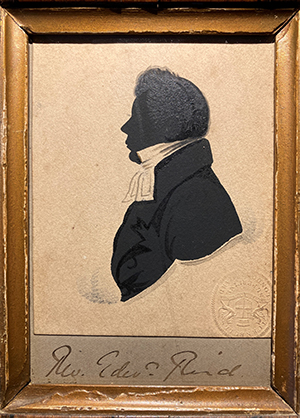The Reids of Ramelton, Jamaica, Glasgow and Belfast
Published in Issue 4 (July/August 2021), News, Volume 29By Dermot Scott

Below: A silhouette of Revd Edward Reid, minister of Ramelton Presbyterian Church, who sent his two teenage sons, George and James Seaton, to Jamaica to be bookkeepers on a sugar plantation where they would have been directly involved in supervising slaves. This was perhaps a rather strange decision for a ‘Presbyterian divine’.
It may seem strange that there should have been a connection in the early nineteenth century between Ramelton, a small provincial town in north-west Ireland, and a Caribbean island. In early 1825 Revd Edward Reid, minister of Ramelton Presbyterian Church, despairing of finding local career opportunities for his numerous family, decided to send two teenage sons, George (17) and James Seaton (14), to Jamaica as bookkeepers. They had been educated at Edward’s school, which aimed to provide a good education in mathematics and the classics.
Edward wrote to his sons in Jamaica: ‘I am glad to hear you arrived safely. Mr Delap says your station is healthy and your manager is a good man. Follow the instructions of Dr McCaskill … I am glad to hear Mr Watt was so kind to you.’ Here at the start of the correspondence with Jamaica we encounter the names of two Ramelton families with Jamaican connections, the Delaps and the Watts. Both families are mentioned in the Legacies of British Slave Ownership database (see HI 29.3, May/June 2021, pp 26–9). The McCaskill family is so far untraced in Ramelton but Edward writes later that he has officiated at the marriage of Dr McCaskill’s sister, so there is a local link.
Bookkeepers were essentially the lowest rung of management on a sugar plantation, directly supervising the slaves. George remained unemployed and ran wild, while James, who was well paid, pleaded to be allowed to return to Ireland. His father and uncle both advised strongly against doing so: ‘You would be mad to give it up’, wrote his uncle. It seems strange that two Presbyterian divines should have been encouraging these youngsters to work on slave plantations, a mere eight years before the abolition of slavery in Jamaica.
The uncle in question was Revd Edward Reid’s younger brother, Revd James Seaton Reid, whom Edward had brought up in Ramelton and who was later to become well known as the author of the History of the Presbyterian Church in Ireland, published in three volumes between 1834 and 1854 and recognised as a significant step in the writing of church history. His namesake in Jamaica, also James Seaton Reid, eventually persuaded his father to allow him to return to Ireland, attended Edinburgh University to qualify in medicine and ended his career as a fashionable medical practitioner in Belfast, professor of Materia Medica at Queen’s University.
James’s younger brother, Edward, thought unfit for a profession, was apprenticed to a merchant in Derry, took over the firm, was elected mayor of Derry on several occasions and was knighted before retiring to England. In 1908 he bequeathed his collection of the family’s correspondence to Revd William Wallace, the then minister of Ramelton. The trove of some 300 letters between these men and their sisters, wives, brothers and children has now been transcribed and will shortly be available online. The original papers will be deposited in the Public Record Office of Northern Ireland (PRONI).
There is much of interest to local historians of Ramelton and Donegal and of Presbyterianism in Ulster. Both Edward and James were elected moderators of synod, Edward at the time of George IV’s Irish visit in 1821 and James in 1828, a time of much disputation. James was later elected clerk of synod and appointed professor of church history at the Institution (now RBAI) before obtaining the chair in Glasgow. There is, too, much of general interest, for instance a vivid insight into the lobbying and boot-licking required to obtain the professorship in Glasgow, which was in the government’s gift. By a happy coincidence, the local squire in Ramelton, Sir James Stewart, had been a close friend of Revd Edward Reid and willingly acceded to a request from Edward’s brother, James, to write on James’s behalf to his brother-in-law Andrew Rutherfurd, the lord advocate in Scotland and ‘a joint sharer [with Fox Maule of the Home Department] in the plunder of Scottish patronage’, as James wrote. It was just in time, for Rutherfurd lost office later that year.
The collection is of interest in extending over most of the nineteenth century and in revealing the lives and travels of four successful men and their families, none of whom found success easily. Always at the back of their minds lay the possibility of failure, of ill health and of premature death.
Dermot Scott, a history graduate of Trinity College, Dublin, is a retired EU official.
















